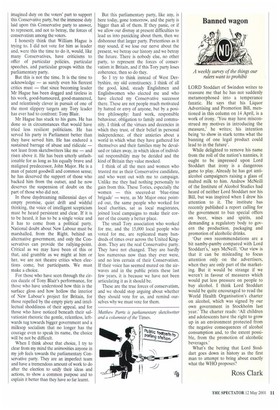Banned wagon
LORD Stoddart of Swindon writes to reassure me that he has not suddenly metamorphosed into a temperance fanatic. He says that his Liquor Advertising and Promotion Bill, mentioned in this column on 14 April, is a work of irony. 'You may have misconstrued my motives in introducing the measure,' he writes; his intention being 'to show in stark terms what the banning of one legal product could lead to in the future'.
While delighted to remove his name from the roll of the nation's nannies, it ought to be impressed upon Lord Stoddart that irony is a dangerous game to play. Already he has got antialcohol campaigners raising a glass of malted milk to him. Andrew McNeill of the Institute of Alcohol Studies had heard of neither Lord Stoddart nor his Bill, but was inspired when I drew his attention to it. The institute has recently published a report calling for the government to ban special offers on beer, wines and spirits, and demanding a regulatory body to govern the production, packaging and promotion of alcoholic drinks.
'Our own recommendations are a bit namby-pamby compared with Lord Stoddart's,' says McNeill. 'Our view is that it can be misleading to focus attention only on the advertisers, when they are only part of the marketing. But it would be strange if we weren't in favour of measures which would put less pressure on people to buy alcohol. I think Lord Stoddart would be quite encouraged to read the World Health Organisation's charter on alcohol, which was signed by our own government in Stockholm last year.' The charter reads: 'All children and adolescents have the right to grow up in an environment protected from the negative consequences of alcohol consumption and, to the extent possible, from the promotion of alcoholic beverages.'
What's the betting that Lord Stoddart goes down in history as the first man to attempt to bring about exactly what the WHO proposes?
Ross Clark


































































 Previous page
Previous page